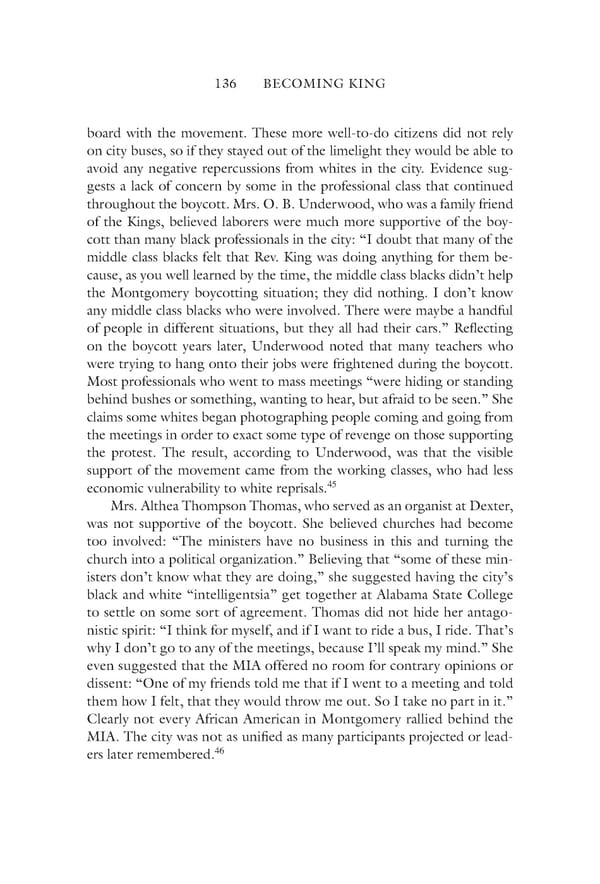136 BECOMING KING board with the movement. These more well-to-do citizens did not rely on city buses, so if they stayed out of the limelight they would be able to avoid any negative repercussions from whites in the city. Evidence sug- gests a lack of concern by some in the professional class that continued throughout the boycott. Mrs. O. B. Underwood, who was a family friend of the Kings, believed laborers were much more supportive of the boy- cott than many black professionals in the city: “I doubt that many of the middle class blacks felt that Rev. King was doing anything for them be- cause, as you well learned by the time, the middle class blacks didn’t help the Montgomery boycotting situation; they did nothing. I don’t know any middle class blacks who were involved. There were maybe a handful of people in different situations, but they all had their cars.” Reflecting on the boycott years later, Underwood noted that many teachers who were trying to hang onto their jobs were frightened during the boycott. Most professionals who went to mass meetings “were hiding or standing behind bushes or something, wanting to hear, but afraid to be seen.” She claims some whites began photographing people coming and going from the meetings in order to exact some type of revenge on those supporting the protest. The result, according to Underwood, was that the visible support of the movement came from the working classes, who had less 45 economic vulnerability to white reprisals. Mrs. Althea Thompson Thomas, who served as an organist at Dexter, was not supportive of the boycott. She believed churches had become too involved: “The ministers have no business in this and turning the church into a political organization.” Believing that “some of these min- isters don’t know what they are doing,” she suggested having the city’s black and white “intelligentsia” get together at Alabama State College to settle on some sort of agreement. Thomas did not hide her antago- nistic spirit: “I think for myself, and if I want to ride a bus, I ride. That’s why I don’t go to any of the meetings, because I’ll speak my mind.” She even suggested that the MIA offered no room for contrary opinions or dissent: “One of my friends told me that if I went to a meeting and told them how I felt, that they would throw me out. So I take no part in it.” Clearly not every African American in Montgomery rallied behind the MIA. The city was not as unified as many participants projected or lead- 46 ers later remembered.
 Becoming King: Martin Luther King Jr. Page 156 Page 158
Becoming King: Martin Luther King Jr. Page 156 Page 158